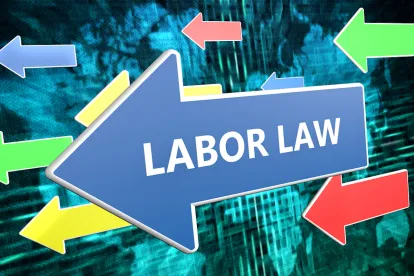The U.S. Department of Labor (DOL) has issued its long-awaited Notice of Proposed Rulemaking (NPRM) seeking to revise Davis-Bacon Act (DBA) regulations.
The NPRM contains a couple of changes that will be beneficial to contractors, but most of the changes favor workers and unions while enhancing the DOL’s enforcement arsenal.
Interested parties may submit written comments on the proposed rules on or before May 17, 2022.
Background
The DBA, enacted in 1931, requires payment of locally prevailing wages and fringe benefits to workers on contracts with federal agencies and the District of Columbia for the “construction, alteration, or repair of public buildings or public works.”
The prevailing wages and benefits required for DBA-covered contracts are set forth in Wage Determinations/Decisions (WDs) issued by the DOL, which are incorporated into covered contracts by contracting agencies.
In addition to the DBA, which applies only to direct federal contracts, Congress has incorporated DBA requirements into over 70 statutes (DBA Related Acts) under which federal agencies provide funding assistance for construction projects primarily through direct funding, grants, loans, loan guarantees, or insurance. A recent example of a DBA Related Act is the new $1.2 trillion Infrastructure Investment and Jobs Act (IIJA), under which many projects funded in whole or in part by the IIJA will carry with it DBA requirements.
It has been 40 years since the DOL last undertook a comprehensive review of the DBA regulations in a rulemaking. Based on changes in contracting processes, newer types of construction projects (particularly in renewable energy), court and administrative agency decisions addressing various DBA issues, and long-standing concerns about the process by which prevailing wages and benefits are set by DOL (which often has resulted in outdated and incomplete wages and benefits, and missing job classifications on WDs), DOL has proposed myriad changes to the regulations. The key proposed changes are discussed below.
Setting Local Prevailing Wage Rates
DOL proposed changes to the definition of “prevailing wage” and to the scope of data to be considered in its wage surveys to set prevailing wages in WDs.
Addressing “the overuse of weighted average rates,” DOL proposed to return to the definition of “prevailing wage” that it used from 1935 to 1983. Currently, a single wage and fringe benefit rate may be identified as prevailing in the area “only if it is paid to a majority of workers in a classification on the wage survey. Otherwise, a weighted average is used.” DOL proposed to return to the “three-step” method that was in effect before 1983. Under that method (also known as the “30-percent rule”), in the absence of a wage rate paid to a majority of workers in a particular classification, a wage rate will be considered prevailing if it is paid to at least 30 percent of such workers. Because unions historically have shown far greater participation in the wage survey process than do non-union contractors, this change likely will result in many more job classifications on WDs reflecting union rates than rates derived from both union and non-union rates that have been submitted in surveys (referred to as Survey rates on WDs).
DOL also has proposed a new methodology to give it the authority and discretion to adopt state or local wage determinations as the DBA prevailing wages where certain specified criteria are satisfied to fill in gaps in its survey data with prevailing rates that have been collected already by state or local agencies. According to DOL, this change will “increase efficiency and reduce confusion for the regulated community where projects are covered by both DBRA and local or State prevailing wage laws and contractors are already familiar with complying with the local or State prevailing wage requirement.” In general, this may be a welcome change for covered contractors.
Finally, DOL proposed a return to its prior policy before the 1981-1982 rulemaking related to the wage survey data submitted for “metropolitan” or “rural” counties and to provide a new mechanism to regularly update Survey prevailing wage rates based on the Bureau of Labor Statistics Employment Cost Index. Under the current practice, union rates on WDs are regularly updated with new wages and benefits in collective bargaining agreements, whereas Survey rates are never updated. Therefore, Survey rates can be over a decade old and not reflective of actual prevailing wage rates in the locality.
Conformances
When DOL does not receive enough information in its survey process to set a prevailing wage rate for job classifications in a locality, or when a new type of job is used on construction projects that did not exist at the time of the survey process, those job classifications will not appear on a WD. If a contractor has workers that it cannot map to existing job classifications on the applicable WD, the contractor must seek a conformance from DOL. Conformance is the process of adding a new job classification with hourly and fringe benefit rates to the WD, but only for the purpose of the project for which the conformance was sought. The conformance process is time-consuming and often results in uncertainty regarding wages and benefits for workers while the conformance is pending.
The proposed revisions would create a new procedure through which DOL can identify and include on WDs wage and fringe benefit rates for job classifications for which conformances frequently are requested. If adopted, this should be a welcome change to contractors.
Expansion of Site of Work, Covered Work
Payment of prevailing wages to workers applies to performing duties at the “site of the work.” DOL is seeking to expand the definition of site of the work to include sites that have been excluded under the current regulations. Among others, these would include off-site construction of “significant portions” of a building or work (such as prefabricated materials manufacturing facilities).
DOL also proposed to expand the DBA coverage of truck drivers, including drivers dropping off materials from material suppliers who were not previously covered under the DBA.
Enforcement
Currently, in order for a contractor to have a contract covered by the DBA or DBA Related Acts, the government contracting or funding agency must include as a contract clause the requirements and the applicable WD(s). If the government agency fails to do so, DOL cannot hold the contractor liable or enforce the requirements unless and until the government agency amends the contract to add the required clauses and WD(s).
In a huge change impacting contractors, DOL proposed that the DBA contract clauses and applicable WD(s) be effective by “operation of law,” notwithstanding their mistaken omission from a contract. Should this proposal be adopted in the final rule, DOL will be able to enforce DBA requirements against contractors and demand back pay even where the contractor had no knowledge that the requirements applied or where the agency failed to provide the contractor a WD for the project.
DOL also has proposed changes to make it easier for DOL to request that contracting and funding agencies withhold contract payments from any contracts a contractor may hold if deemed necessary by DOL to secure funds for potential back pay during a DOL DBA investigation. DOL proposed to “clarify” that cross withholding may be made on contracts held by agencies other than the agency that awarded the contract. Further, it would create a new contract requirement that contractors must consent to cross withholding for back wages owed on contracts held by different but related legal entities (those controlled by the same controlling shareholder or entities that are joint venturers or partners on a federal contract).
DOL proposed to “harmonize” DBA and DBA Related Acts debarment standards, to make it easier for DOL to debar contractors under the DBA Related Acts for a mandatory three-year period. DOL also would add anti-retaliation provisions in the DBA contract clauses intended to protect workers who raise concerns about payment practices or assist agencies or the DOL in investigations.
What Should Contractors Do Now?
Many of the changes to the DBA regulations proposed in the NPRM will have significant impacts on contractors with respect to costs, compliance responsibilities, and enforcement exposure and penalties. Contractors should take the time to review the NPRM carefully and consider filing comments, including through industry trade associations.




 />i
/>i

